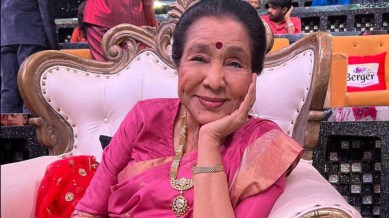📣 For more lifestyle news, click here to join our WhatsApp Channel and also follow us on Instagram
Asha Bhosle on modern women considering childbearing as a ‘burden’; expert decodes evolution of relationship dynamics and changing expectations
“I started working as a playback singer at the age of 10. During this time, I had three children, raised them, married them off and now have grandchildren,” Bhosle said.

Legendary playback singer Asha Bhosle has criticised women who view childbearing as a burden. In an interaction with spiritual leader Ravi Shankar she spoke about the rise in divorce cases among young couples today.
Drawing from her own experiences of raising three children single-handedly, Bhosle emphasised the importance of embracing motherhood rather than resenting it. “I have spent most of my years in the film industry and seen many people but, earlier, they never used to take such drastic steps like the current generation does. I feel that the love between them ends very soon and they get bored with each other fast too. Maybe that’s one of the main reasons (for the apparent increase in divorces),” she said.
monthly limit of free stories.
with an Express account.
During their conversation, she added that today women consider that “childbearing is a burden.” She continued, “It’s perhaps a reality in the lower strata of society. But even the middle and higher class. I started working as a playback singer at the age of 10. During this time, I had three children, raised them, married them off and now have grandchildren. I executed all the responsibilities successfully and single-handedly, without my husband. I did all this when I was a busy professional, working day and night. Yet, I looked after my children, their studies.”
As societal norms evolve, the dynamics of relationships and the expectations surrounding love and marriage have shifted significantly.
Gurleen Baruah, an occupational psychologist and executive coach at That Culture Thing, offers insights into the context of Bhosle’s experiences and the broader changes in Indian society.
A glimpse into the past
“Asha Bhosle’s life story reflects a generation when societal expectations were vastly different, especially for women,” Baruah explains. “She eloped and married at the young age of 16 in the 1950s, a time when very few women were pursuing careers, let alone thriving in them.”
During this era, societal expectations for women primarily revolved around marriage and motherhood, with little emphasis on professional ambitions. Bhosle’s success in both her career and family life speaks to her extraordinary resilience and highlights the challenges women of her era faced in balancing personal ambitions with familial duties.
The changing landscape
Baruah notes that societal expectations of motherhood have shifted significantly over the past few decades in India due to various factors:
Economic Factors: “The cost of living, education, and raising children is at an all-time high, making parenthood a more calculated decision,” says Baruah.
Family Structure: Many couples now live in nuclear setups, with both partners often working to maintain their careers.
Diverse Perspectives: Today’s couples have varied views on what constitutes a fulfilling life, with many finding meaning outside of parenthood through careers, travel, hobbies, and community engagement.
Environmental Concerns: Issues like pollution and overall quality of life contribute to decisions about having children.
Evolution of relationship dynamics
The shift in societal expectations has also impacted relationship dynamics. Baruah explains, “Now, there’s more choice and personal autonomy, especially for women. While it’s not the case for everyone, in urban settings, there’s generally more freedom in relationships.”
Key changes include:
- Women seeking companionship based on mutual respect rather than traditional roles.
- A move away from rigid, stereotypical roles for both men and women.
- Love now means living life together with more autonomy, freedom, and shared contributions.
The role of cultural narratives
Cultural narratives continue to play a significant role in shaping women’s attitudes toward childbearing and family responsibilities. Baruah points out that these narratives can vary depending on broader Indian culture and family subcultures.
In modern Indian society, particularly in urban areas, women are increasingly able to balance personal ambitions with family responsibilities. “Women today don’t just want to be associated with the roles of wife and mother. They seek to live life according to their own desires and aspirations,” Baruah notes.
Why we still have a long way to go
Today’s women in India, especially in urban areas, have more choices and autonomy in their decisions about career, marriage, and motherhood.
However, as Baruah reminds us, “It’s not perfect yet, but gradual progress is happening. Cultural narratives continue to evolve, allowing women to redefine their roles and take charge of their choices around family and career in ways that previous generations may not have had the opportunity to do.”
📣 For more lifestyle news, click here to join our WhatsApp Channel and also follow us on Instagram